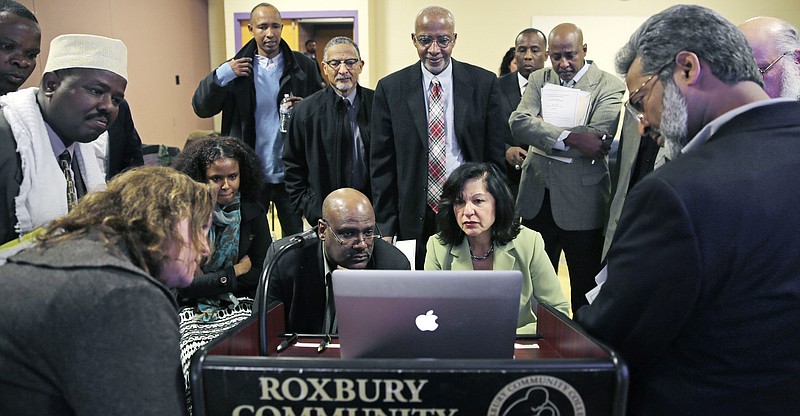BOSTON (AP) - A federally backed effort to stem the rise of homegrown extremists is underway in Massachusetts, nearly three years after the White House announced the initiative on the first anniversary of the Boston Marathon bombings that killed three people and injured hundreds.
The state last week selected three organizations to use $210,000 in federal money earmarked for the pilot effort, The Associated Press learned through a request of public records. The organizations propose initiatives meant to keep youths from being drawn to the violent messages of extremist groups.
United Somali Youth - which operates out of New England's largest mosque, the Islamic Society of Boston Cultural Center - was awarded $105,000 to help Somali, African and Middle Eastern youths build critical life skills through afterschool programs, counseling, college readiness assistance and other efforts.
Empower Peace, which was founded by a communications and marketing executive, was given $42,000 to teach high schoolers statewide how to develop social media campaigns promoting tolerance and combating bigotry so that they can produce them at their schools.
And the 20-year-old Somali Development Center has been given $63,000 to better integrate Somali immigrants and refugees into the broader community.
Abdirahman Yusuf, the center's executive director, said the Boston-area Somali community hasn't had to grapple with terrorist recruitment like those in other parts of the country but needs to take preventative steps.
"With events like Columbus, Ohio, it's important for our community to have a dialogue," he said, referring to last month's car and knife attack at Ohio State University by a Somali-born student that is being investigated as possible terrorism. "This is a relevant issue."
But with a new administration moving into the White House, there's "real concern" over the future of such programs, said John Cohen, who helped President Barack Obama's administration develop its "countering violent extremism" strategy that included pilot efforts in Los Angeles and Minneapolis in addition to Boston.
A spokesman for President-elect Donald Trump's transition team didn't immediately comment. But, on the campaign trail, Trump and his surrogates suggested they'd take more aggressive steps to combating Islamic extremism than the current administration, including banning Muslims from entering the country and surveilling mosques and Muslim residents.
Local critics in Massachusetts complain the focus on Somalis and other predominantly Muslim minority communities runs counter to the program's stated mission of addressing all manner of violent ideologies, not just Islamic extremists.
"CVE predominantly targets Somalis, Muslims, and Arabs - falsely legitimizing hostility against these communities," said Shannon Erwin, of the Boston-based Muslim Justice League.
The state Executive Office of Health and Human Services, which awarded the money, stressed the agency didn't expressly seek out Somali or Muslim-focused initiatives. Instead, it said, it broadly sought proposals addressing violence motivated by racial, religious or gender-based prejudice or that intended to influence government conduct through mass destruction, assassination or kidnapping.
The agency received just four applications, one of which didn't meet the grant's requirements, according to documents obtained by the AP. And while two were Somali-based nonprofits, the third, Empower Peace, encompasses a broader population.
The three pilot cities have been slow to roll out their programs since they were touted at a global White House summit last year as pillars of the Obama administration's broader strategy to combat extremist thinking.
Minneapolis is the farthest along, having doled out its grant money in March to six organizations focused on the Somali community. In Los Angeles, grant money was used on a local "countering violent extremism" office, community meetings and other planning expenses, according to federal officials.
Still, the U.S. Department of Homeland Security has moved ahead on other fronts. This summer, it began seeking proposals for $10 million to finance more efforts in those three cities and elsewhere.
A projected Dec. 1 start for those programs has come and gone, but spokesman Neema Hakim said the office hopes to announce its picks before the end of the year.
___
Follow Philip Marcelo at twitter.com/philmarcelo. His work can be found at http://bigstory.ap.org/journalist/philip-marcelo
